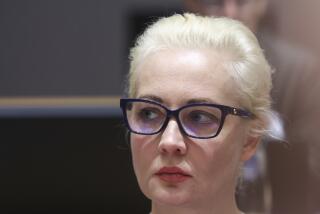Kazakh leader’s daughter confirms divorce
MOSCOW — The influential daughter of Kazakhstan’s president confirmed Wednesday that she has divorced her fugitive husband, a move likely to preserve her status as a potential successor in the Central Asian state.
Authorities issued an international arrest warrant last month for Rakhat Aliyev on kidnapping charges that he said were triggered by a political falling-out with his father-in-law, President Nursultan A. Nazarbayev.
The divorce keeps the door open for the strongman, who has long dominated the oil-rich nation, to eventually hand over power to his daughter, Dariga Nazarbayeva. She is a leader of the Nur Otan party, which supports the president.
Aliyev, 44, who had been Kazakhstan’s ambassador to Austria until two days before the arrest warrant was issued, was briefly held by Austrian police and released on $1.3-million bail. He remains in that country to face extradition proceedings.
The former couple have three children.
The Aliyev case marked the eruption of open infighting among the political elite in Kazakhstan and raised fresh doubts about the country’s commitment to building a more democratic system. Aliyev has said he told his father-in-law several months ago that he planned to run for president in 2012, and he says the legal assault against him was launched in response.
The Kazakh Constitution, which would have required Nazarbayev, 66, to step down in 2012, was amended in May to allow him to seek reelection without limit. He has ruled Kazakhstan since 1990, a year before the republic’s independence from the Soviet Union.
Other approved amendments changed the structure and voting system for Parliament. To allow those amendments to take effect sooner, Nazarbayev on Wednesday dissolved Parliament and set new elections for August.
His 44-year-old daughter confirmed the divorce in an interview posted on the website of Kazakhstan Today, a news agency owned and controlled by Aliyev until his fall from grace last month.
“Members of the Nazarbayev family are doomed to constant and not always benevolent attention, which almost excludes private life,” she said. “There are many rumors. I can confirm only one: about divorce. This has been a hard experience for my family. I can only add that this was a painful and carefully considered decision.”
Aliyev said this month that he had received divorce documents on which his signature had been forged. He said Nazarbayeva told him by telephone that she had been pressured into divorce by her father.
Aidos Sarimov, a political analyst at the Altynbek Sarsenbayev Foundation, an opposition-linked think tank in Almaty, said the divorce appeared necessary to insulate Nazarbayeva against fallout from the criminal case against Aliyev.
“Today you can see Dariga practically on every channel, not as a political figure but as a singer or a social figure,” Sarimov said. “In two years, when everyone forgets about her divorce with Rakhat, she will probably enter big-time politics, possibly as a senator.”
The kidnapping charges relate to the January abductions of Abilmazhen Gilimov, chairman of the Nurbank commercial bank, which Aliyev controlled, and two associates. Gilimov was released and accused Aliyev of abducting him. The other two men are still reported missing.
It was recently announced that Nazarbayeva and her son Nurali have become major shareholders in Nurbank, leading to speculation that the move was part of a divorce settlement.
Lyudmila Zhulanova, deputy head of the opposition Ak Zhol party, said that she believed the charges against Aliyev and the divorce would damage the image of the family and the country, but that there is a positive side in that someone from the inner elite is facing criminal charges.
“Everyone knew about corruption, but the people involved in it were under Nazarbayev’s personal protection,” she said. “Now I hope that the exclusive right to deal with these issues will be given to our judicial system, as happens in every democratic state.”
--
Yakov Ryzhak of The Times’ Moscow Bureau contributed to this report.
More to Read
Sign up for Essential California
The most important California stories and recommendations in your inbox every morning.
You may occasionally receive promotional content from the Los Angeles Times.










